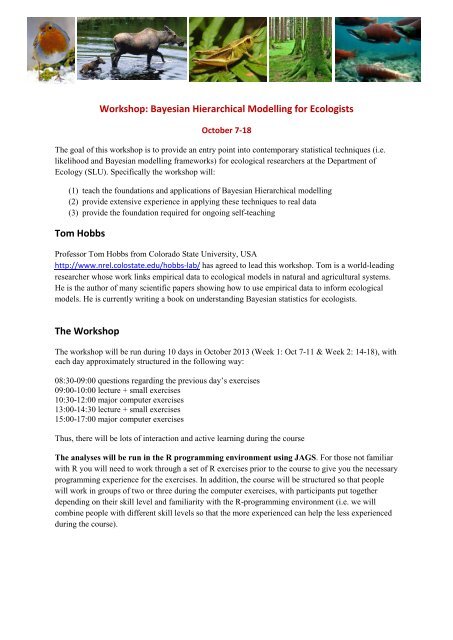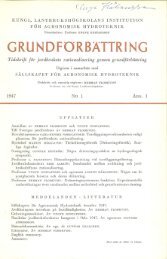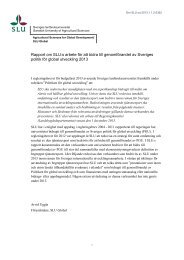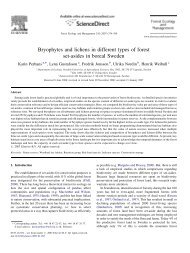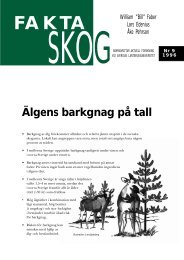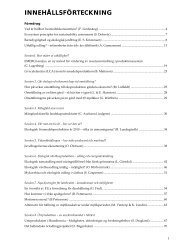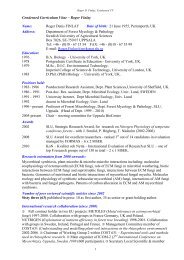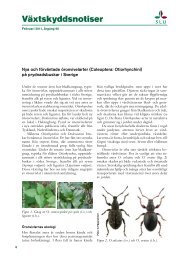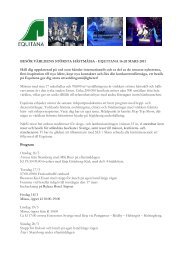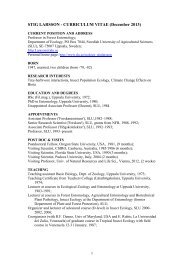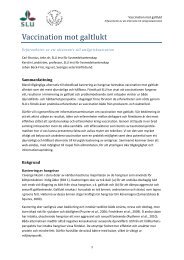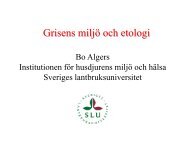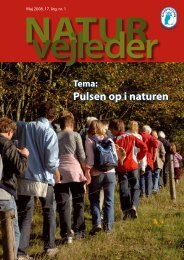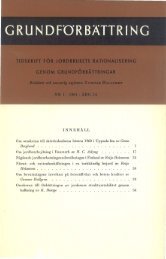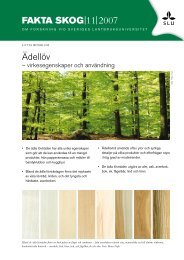Workshop: Bayesian Hierarchical Modelling for Ecologists Tom ...
Workshop: Bayesian Hierarchical Modelling for Ecologists Tom ...
Workshop: Bayesian Hierarchical Modelling for Ecologists Tom ...
You also want an ePaper? Increase the reach of your titles
YUMPU automatically turns print PDFs into web optimized ePapers that Google loves.
<strong>Workshop</strong>: <strong>Bayesian</strong> <strong>Hierarchical</strong> <strong>Modelling</strong> <strong>for</strong> <strong>Ecologists</strong><br />
October 7-18<br />
The goal of this workshop is to provide an entry point into contemporary statistical techniques (i.e.<br />
likelihood and <strong>Bayesian</strong> modelling frameworks) <strong>for</strong> ecological researchers at the Department of<br />
Ecology (SLU). Specifically the workshop will:<br />
(1) teach the foundations and applications of <strong>Bayesian</strong> <strong>Hierarchical</strong> modelling<br />
(2) provide extensive experience in applying these techniques to real data<br />
(3) provide the foundation required <strong>for</strong> ongoing self-teaching<br />
<strong>Tom</strong> Hobbs<br />
Professor <strong>Tom</strong> Hobbs from Colorado State University, USA<br />
http://www.nrel.colostate.edu/hobbs-lab/ has agreed to lead this workshop. <strong>Tom</strong> is a world-leading<br />
researcher whose work links empirical data to ecological models in natural and agricultural systems.<br />
He is the author of many scientific papers showing how to use empirical data to in<strong>for</strong>m ecological<br />
models. He is currently writing a book on understanding <strong>Bayesian</strong> statistics <strong>for</strong> ecologists.<br />
The <strong>Workshop</strong><br />
The workshop will be run during 10 days in October 2013 (Week 1: Oct 7-11 & Week 2: 14-18), with<br />
each day approximately structured in the following way:<br />
08:30-09:00 questions regarding the previous day’s exercises<br />
09:00-10:00 lecture + small exercises<br />
10:30-12:00 major computer exercises<br />
13:00-14:30 lecture + small exercises<br />
15:00-17:00 major computer exercises<br />
Thus, there will be lots of interaction and active learning during the course<br />
The analyses will be run in the R programming environment using JAGS. For those not familiar<br />
with R you will need to work through a set of R exercises prior to the course to give you the necessary<br />
programming experience <strong>for</strong> the exercises. In addition, the course will be structured so that people<br />
will work in groups of two or three during the computer exercises, with participants put together<br />
depending on their skill level and familiarity with the R-programming environment (i.e. we will<br />
combine people with different skill levels so that the more experienced can help the less experienced<br />
during the course).
Where, what and when?<br />
Week 1: Akademihotellet (Övre Slottsgatan, Uppsala)<br />
Course*: Likelihood, probability distributions,<br />
programming MCMC, understanding Bayes theorem and<br />
deriving it from the laws of probability, advantages of<br />
<strong>Bayesian</strong> approaches over frequentist<br />
Details: Day conference facilities, fika and lunch provided<br />
<strong>for</strong> 5 days. Dinner and accommodation (if needed) are the<br />
responsibility of the participant – we have special rates <strong>for</strong><br />
staying at Akademihotellet<br />
*as a guide only<br />
Week 2: Akademihotellet (Övre Slottsgatan, Uppsala)<br />
Course: <strong>Bayesian</strong> hierarchical modelling, dynamic statespace<br />
models, model selection<br />
Details: Day conference facilities, fika and lunch provided<br />
<strong>for</strong> 5 days. Dinner and accommodation (if needed) are the<br />
responsibility of the participant – we have special rates <strong>for</strong><br />
staying at Akademihotellet<br />
Who and how much?<br />
There is space <strong>for</strong> a maximum of 20 participants and the course is open to all researchers – including<br />
PhDs.<br />
The Department of Ecology at SLU in conjunction with the Ecology Research School and a grant<br />
from the August T Larsson Guest Researcher fund will cover most of the costs involved; however, it<br />
may be necessary that each participant needs to contribute a few thousand SEK <strong>for</strong> the 2 week course<br />
(exact amount to be confirmed).<br />
What will I get?<br />
You will get a brilliant and in-depth 2-week introduction into the world of contemporary statistical<br />
ecological modelling using a <strong>Bayesian</strong> hierarchical framework. You will get the conference facilities,<br />
fika and lunch provided in Uppsala. <strong>Tom</strong> will also distribute course notes and copies of his lectures<br />
during the two weeks. For PhDs the course credits will be 4.5 ECTS.<br />
How do I apply (or <strong>for</strong> more in<strong>for</strong>mation)?<br />
Contact: Matt Low at matt.low@slu.se<br />
In case the course is oversubscribed there will need to be some selection of participants – could<br />
applicants please motivate, in a few lines, why this course would be of value to them in their work<br />
here at SLU.


